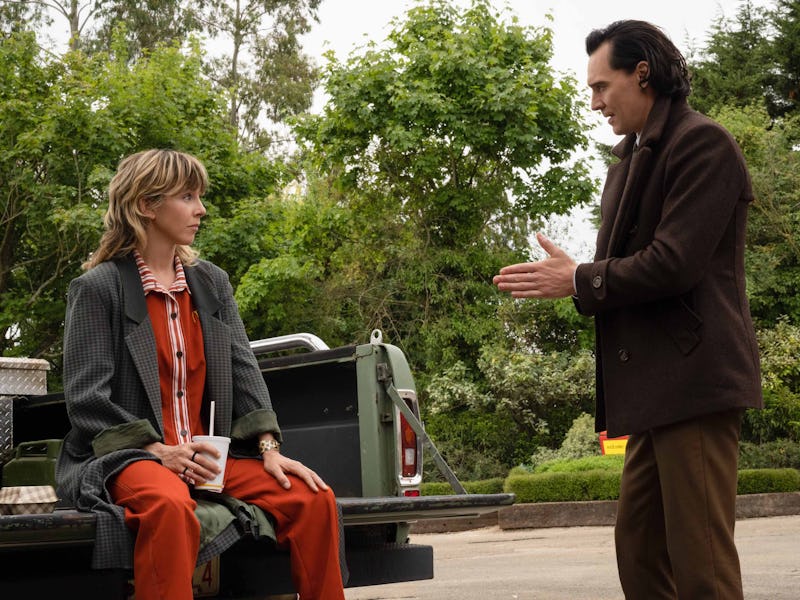Loki Forgets The One Counterintuitive Thing That Makes Time-Travel Shows Work
Paradoxes and twists are well in good. But what’s the baseline?

What is at stake in Loki? The short answer is the fate of the universe and the timeline as we know it. But which one? Somewhat brilliantly, Season 1 of Loki created a brand-new version of an existing Marvel supervillain, and rapidly turned him into a kind of accidental hero, crusading for the rights of those people who exist outside of the “Sacred Timeline.” In Season 2, Loki, Mobius, Loki, Sylvie, Miss Minutes, Renslayer, and the entire kooky world of the Time Variance Authority are back, now with even more paradoxes and reality-bending plot twists. But, the answer to the question about stakes is proving elusive. Now halfway through its six-episode run Loki Season 2 seems to have one driving purpose: to see how its characters survive mystery-box plot twists. But is this working?
Loki Season 2 is on very shaky ground for folks who are both casual sci-fi fans and casual MCU fans. Keeping track of what is going on in the first episode alone makes the continuity of Doctor Who seem straightforward by comparison. But why? If you’re having a hard time investing in Loki Season 2, even if you aren’t confused about the plot, there’s one very specific reason why. Loki is breaking a major rule of time-travel TV shows, and it’s doing so flagrantly.
Mild spoilers ahead for Loki Season 2.
Loki lacks a status quo to care about
Do we care how this happened?
Here’s the thing that’s frustrating about Loki, and why the second season feels so fragmented emotionally. It doesn’t happen anywhere. There’s no place or emotional status quo that it exists in, at all. Part of this is built into the premise. Loki himself and the vast majority of the other characters are all variants from the sacred timeline. This means they’ve only existed in the halls of the TVA, enslaved to protect a primary timeline they’re not a part of. It’s a cool idea, but within that basic reveal at the end of Season 1, Loki overplayed its hand. If the Marvel universe status quo is bad for all of these people, and various branched timelines are overlapping, what’s home base? What’s the thing that we’re supposed to think of as normal, or at the very least, desirable?
A Marvel apologist would say the lack of an answer to this question is why the show is good, but a lack of understanding about any kind of emotional baseline, or vague original setting just makes the show hard to care about. The TVA is bad and oppressive, the branched timelines are bad, and the sacred timeline is bad, and the versions of these characters aren’t even the only versions of the characters that are available. New variants can (and do!) pop up whenever the plot needs them to. The time travel and parallel worlds aspect of the show lacks any real narrative oomph because we don’t really buy that there’s any structure to these events at all. When Loki is listening to the tape recorder in Episode 1, it’s supposed to be this big ah-ha moment of a paradox, but instead, it’s a bland revelation, because nothing in the world of the TVA matters.
What other time-travel shows do right
12 Monkeys gets TV time travel very right.
Other time travel shows don’t do this. Although famous for time loops and paradoxes, Doctor Who actually has a great deal of restraint when it comes to solving problems with an ouroboros. In fact, the vast majority of episodes prior to 2005 aren’t actually about time paradoxes at all. Furthermore, Doctor Who tends to ground its emotional stakes with contemporary companions who live on a contemporary Earth. This helps us care, and when the wibbly-wobbly paradoxes do happen, we have an emotional sense of what could be lost or gained.
Ditto the TV version of 12 Monkeys, which adheres to the same rule of groundedness: James Cole from the future, trying to stop a pandemic from happening in the past. The Witness seems to have answers for how it all happened, but thanks to time travel, things spider-web from there over that show’s impressively intricate four seasons.
It always comes back to a status quo and characters we understand. If the characters are on time travel jaunts to historical periods, we know they’re going to get pulled back to base at some point. In Season 1 of Loki, what passed for an emotional status quo was the emerging relationship between Loki and Sylvie, but now, she’s a B-squad character.
So, what are we left with? Again, the TVA itself seems to be the only kind of tonal consistency the show has going for it. But, again, do we actually care about what happens to the TVA? At the point at which there are infinite branching timelines, couldn’t we just easily imagine alternate versions of every single one of these episodes? Loki has taken the emotional guardrails off of time travel and alternate timelines, and in doing so, created a series with stakes so massive that they feel nonexistent.